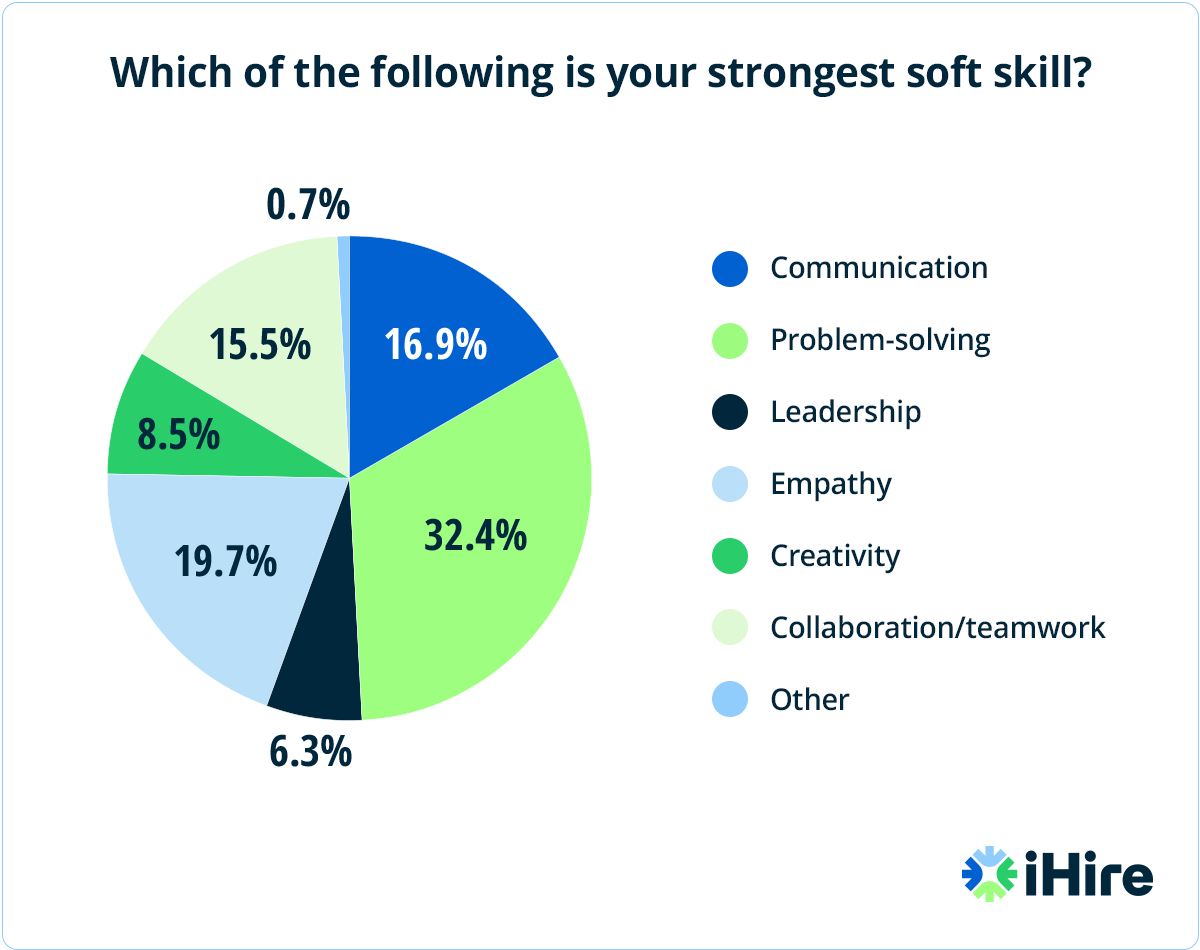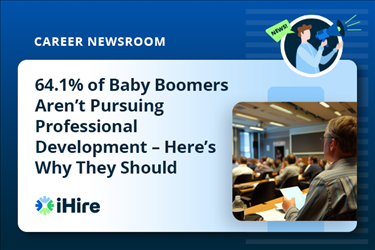- Job Seeker Resources
- |
- Last Updated: July 10, 2025

How to Turn Your Soft Skills Into Superpowers [Questions, Answers & Poll Results]
1. What are effective ways to build strong communication skills, especially in remote or hybrid work environments?
Answer: Strong communication skills start with clarity, active listening, and message adaptability. Tailor your tone and delivery to the audience and format, email, chat, or video. In remote or hybrid work, check for understanding and invite feedback to avoid miscommunication.
- Practice active listening by summarizing what others say before responding.
- Rehearse delivering complex or sensitive messages in writing and aloud.
- Schedule short, recurring video or phone check-ins to reinforce connection and clarity.
Recommended Reading
Job Search Soft Skills 101: Communication
2. How can I assess my current soft skills and identify areas for growth?
Answer: Begin with self-reflection and include structured assessments for insight. Ask yourself which situations are the hardest: conflict, feedback, managing deadlines? Then use free career tools, such as strengths assessments, to highlight your key traits and identify gaps. Combine these results with peer feedback to confirm your standing and identify areas for improvement.
- Take two to three free online assessments and compare results (e.g., skills, interests, values).
- Ask select peers what soft skill stands out most and where they think you could improve.
- Set SMART goals and pick one skill to work on, e.g., “I will improve active listening by practicing reflective responses in every meeting for a month.”
Recommended Reading
Guide to the Top 5 Free Online Career Assessments
3. Do I need to list every soft skill from a job description on my resume to get past the ATS?
Answer: No, you don’t need to list every soft skill verbatim. Instead, map three to five core required skills to your actual strengths, and illustrate them in your summary, skills, and/or achievements sections. ATS software scans for keywords, so use the phrasing precisely, but always back each with an outcome-based example. Pairing keyword presence with demonstrated results makes your resume stronger.
- Highlight critical skills from the job posting and verify you’ve reflected them (e.g., “communication,” “leadership”).
- Under each bullet point, include a concrete result showing the skill in action.
- In your summary, weave in soft skill keywords with context (“collaborative project manager,” “adaptable communicator”).
Recommended Reading
How to Beat Applicant Tracking Systems: Dos & Don’ts
4. How can I role-play and showcase soft skills like adaptability and leadership in an interview?
Answer: Use the STAR format (Situation, Task, Action, Result) to craft two to three stories that highlight your soft skills. Practice role-playing with a friend: have them pose typical behavioral questions, such as “Tell me about a time you led without authority.” These practice sessions help you develop your adaptability and leadership skills with clarity and confidence.
- Write STAR stories focused on resolving conflicts, leading peers, or demonstrating adaptability.
- Role-play Q&A sessions, asking for feedback on how you come across.
- Tailor each outcome to show real-world impact (e.g., improved team morale).
Recommended Reading
Make Your Interview Soft Skills Shine: A How-To Guide

5. What are practical methods to improve time management in high-pressure or changing environments?
Answer: Structure and deliberate prioritization reinforce effective time management. Start by categorizing tasks by impact and deadlines, then use time blocking to protect your focus zones. Incorporate buffer time to account for unexpected tasks. This is key in remote/hybrid settings.
- Adopt the Eisenhower matrix to separate urgent/important tasks.
- Block out “deep work” slots and avoid interruptions.
- Reflect weekly on what took longer than expected and adjust future planning.
Recommended Reading
Job Search Soft Skills 101: Time Management
6. How do I develop leadership skills when I’m not in a supervisory role?
Answer: Leadership is about influence, not title. Start by volunteering for cross-functional projects or leading meetings. Offer to mentor or coach new team members – leadership roots in service and guidance. Show initiative, ask insightful questions, and present solutions.
- Lead a volunteer project or small internal initiative.
- Become a mentor and offer structure, goals, and regular check-ins.
- Ask for occasional mentoring yourself and mirror those leadership behaviors.
Recommended Reading
Soft Skills 101: Leadership
7. How can I use the STAR method to highlight my soft skills during an interview?
Answer: The STAR method (Situation, Task, Action, Result) is a powerful framework for demonstrating soft skills through storytelling. Choose examples that show how you’ve applied skills like communication, adaptability, or leadership. Clearly outline the situation, define your role, explain the steps you took, and share measurable outcomes. Using STAR helps interviewers visualize your strengths and gives structure to your responses, making your soft skills more memorable and credible.
- Select two to three stories that showcase key soft skills aligned with the job description.
- Practice your STAR responses aloud to ensure they’re concise and focused.
- Highlight the Action and Result to clearly show how your behavior led to success.
Recommended Reading
How to Answer Job Interview Questions With the STAR Method [Free Worksheet]
Ready to Find a New Job?
Create your free account today for a faster, easier job search.

Job Seeker Sign In
We Value Your Privacy
8. How can I demonstrate genuine empathy in professional settings without becoming too personal?
Answer: Empathy at work means showing understanding and respect, not oversharing. Listen attentively to colleagues, paraphrase to confirm understanding (“It seems you felt…”), and respond with solutions or support. Keep boundaries clear: focus comments on how to support outcomes, not personal life.
- Practice reflective listening in meetings: echo what was said before responding.
- Acknowledge feelings, then shift to action-oriented support.
- Keep feedback professional and limit sensitive sharing to appropriate contexts.
Recommended Reading
Professionalism Decoded: How to Be Professional at Work and During Your Job Search
9. How do I leverage soft skills like conflict resolution or adaptability when transitioning between sectors, like government to private?
Answer: In transitions, soft skills are your bridge. Frame them as assets transferable across environments and use real examples: adapting to shifting regulations demonstrates agility; mediating between agencies displays conflict resolution. On resumes and in interviews, align these stories with private sector values.
- Rewrite your experiences in a private-sector context (“revenue impact,” “cross-functional collaboration”).
- Use STAR stories emphasizing adaptability under change.
- Highlight any training or mentorship roles to show leadership.
Recommended Reading
Leaving a Government Job for the Private Sector: Public vs. Private Sector Jobs, Resumes & More
10. What is mentoring, how does it work, and is mentoring itself a soft skill?
Answer: Mentoring involves guiding someone’s growth by sharing knowledge, offering feedback, and asking reflective questions. The key soft skills used are active listening, empathy, communication, and leadership. Effective mentoring is structured – with goals, meetings, and mutual accountability. Yes, mentoring is both a process and a demonstration of soft skills like coaching, empathy, and relationship-building.
- Volunteer as a mentor in workplace or community programs with clear objectives.
- Set SMART goals and schedule recurring check-ins.
- Reflect and ask for feedback on your impact.
Recommended Reading
The Importance of Mentorship: How to Be a Great Mentee
View the full on-demand webinar, “How to Turn Your Soft Skills Into Superpowers,” anytime for additional guidance.
Sign In or Register to access all articles and insider tips for help in your job search.
Search for School Administration Jobs
RELATED JOBS
Soliant Health is partnering with a great school district near Columbus, OH. Interviewing now...
Academic Advisor and Veterans Affairs School Certifying OfficialP osition Summary: Franklin University, a private, independent, accredited, not-for-profit...
Pediatric Speech and Language Pathologist in Grove City, OHCategory Schools - SLP Job Type Contract A rewarding contract opportunity is available for two...
Pediatric Speech-Language Pathologist in Columbus, OHAn opportunity is available for a skilled Speech-Language Pathologist to provide comprehensive...
Physical Therapist (School) – 25/26 SYThe Physical Therapist is responsible for performing student evaluations, as well as providing...
RELATED RESOURCES
Find the Right Job Faster
- Get personalized job matches sent to your inbox every day
- Connect directly with employers before your competition
- Advance your career with expert advice on interviewing, salary negotiation, and more
We value your privacy




